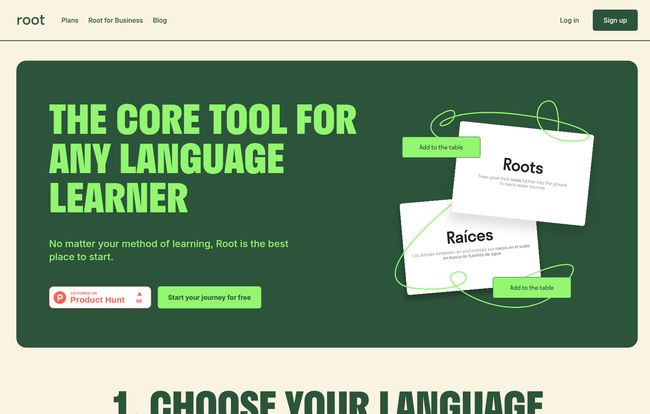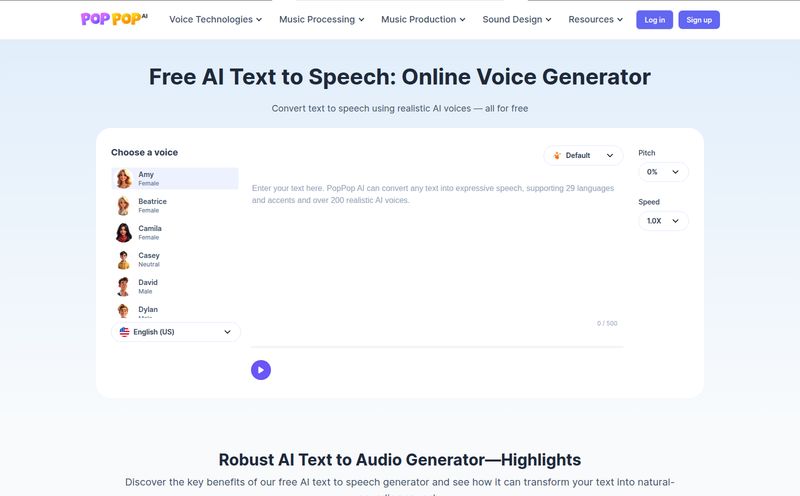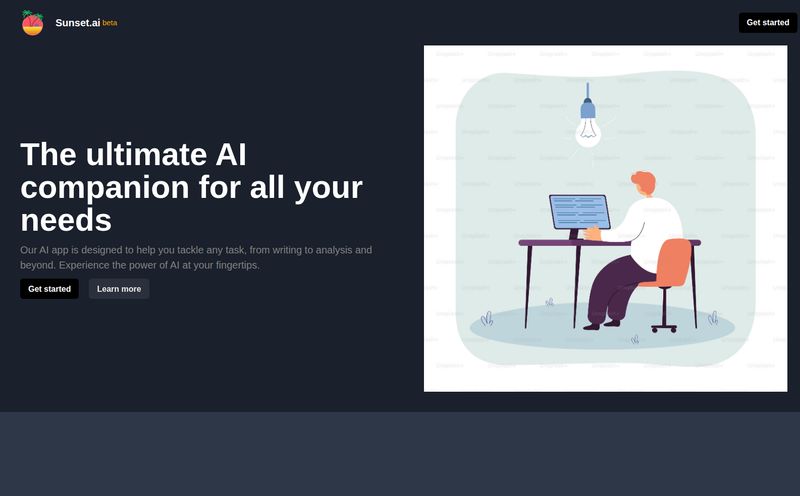We've all been there. You get super excited about learning a new language. You download an app, you buy a textbook, you create a pristine new notebook. For a week, you're a machine. Then, life happens. That notebook starts gathering dust, and the new words you learned fade into a distant memory. It's the classic graveyard of forgotten vocabulary, and I've got a whole cemetery full of them from my attempts at Japanese and German.
For years, the go-to solution has been flashcards. Digital ones, physical ones... it's all the same. Write word, write definition, drill until your eyes glaze over. It works, kinda. But it’s a bit soulless, isn't it? That’s why when I stumbled upon Root Vocab, which calls itself an “AI-powered vocabulary tracker,” my curiosity was definitely piqued. Another app promising to change everything? Skeptical, but intrigued.
So I dove in, credit card safely in my wallet (for now), to see if this was just another flashcard app in a fancy AI costume or something genuinely useful. Here's my no-fluff, hands-on review.
So, What is Root Vocab Anyway?
At its heart, Root is a tool for learning and remembering words. But calling it just a “flashcard app” is like calling a smartphone just a “device for making calls.” The secret sauce here is the AI. Instead of just showing you a word and its translation, Root aims to build a whole universe around that word for you. Think of it less like a drill sergeant and more like a personal language tutor who knows exactly what you need to see and hear to make a word stick.
It’s built on the idea that context is king. You don't just learn 'maison' means 'house' in French. You get example sentences, you hear it pronounced correctly, and you can even see it mapped out with related concepts. It’s designed to take a word from being an abstract piece of data in your brain to a concrete concept you actually understand.
Getting Started: My First 30 Minutes with Root
The sign-up was painless. The first thing you do is pick your language, and they have over 50. I saw the usual suspects like Spanish and French, but also languages like Bengali and Turkish which is a nice touch. I decided to resurrect my long-suffering Spanish.
The interface is clean. Like, really clean. No cartoony mascots guilting you into your next lesson. It gets straight to the point: build your deck. You can add words from scratch or use their tools. I typed in "artista" (artist). Immediately, it populated the Spanish word and the English translation.
But then comes the cool part. With a click, the AI generated a simple example sentence:
El artista está pintando
(The artist is painting). Another click, and a clear, non-robotic voice pronounced the word for me. This is what I’m talking about! It's a small thing, but getting that immediate, multi-sensory input for a new word is huge for retention.

Visit Root Vocab
The whole process felt intuitive. You build your list of words, or your "deck," and then you tell the app you're ready to practice. It's a simple, effective loop. No unnecessary bells and whistles to distract you.
The Features That Actually Matter
Okay, let's get into the nitty-gritty. What makes this tool stand out from the crowd of Ankis and Quizlets out there?
The AI Magic: More Than Just Definitions
The AI-driven features are the main event. The example sentence generator is fantastic. We all know from experience that a word learned in isolation is a word easily forgotten. Seeing it used in a sentence provides the context your brain needs to build a proper connection. The AI can also generate essays and "word maps," which show connections between words. It’s a bit like a personal brainstorming partner helping you explore the language.
Practice That Doesn't Feel Like a Chore
Root uses a flashcard system, but it feels smarter. It's clearly built on a Spaced Repetition System (SRS), an algorithm that shows you words right before you're about to forget them. It’s a proven method, and Root's implementation feels smooth. They also have games to make practice more engaging. It’s a small thing, but turning a study session into a quick game can be the difference between practicing for 5 minutes and practicing for 20.
For the Data Nerds: Tracking Your Progress
I’m a sucker for good data. Root has a full statistics panel that shows you how many cards you've learned, your streak, your word levels, and more. Seeing those numbers go up is surprisingly motivating. It’s tangible proof that you're making progress, even on days when it doesn’t feel like it. It transforms learning from a vague goal into a series of measurable achievements.
Who is Root Vocab For? (And Who Should Skip It?)
This tool isn't a one-size-fits-all solution. In my opinion, Root is perfect for the independent learner. If you're someone who is self-motivated and just needs a powerful tool to organize and drill vocabulary, this is for you. It's also brilliant for polyglots who are juggling multiple languages and need one central place to manage their vocabulary decks.
However, if you're a total beginner looking for a comprehensive, guided course, this might not be your best starting point. Root is a vocabulary specialist; it won't teach you grammar from the ground up. You won't find detailed lessons on verb conjugations or sentence structure here. It’s a supplement, a very powerful one, but not a replacement for a full curriculum or a teacher. Also, if you need a strong community or social-gamified experience like Duolingo, you'll find Root's current social features a bit sparse, as they are still in development.
Let's Talk Money: The Pricing Breakdown
Okay, the all-important question: what's it gonna cost? This is where Root really impressed me.
The Free tier is incredibly generous. You get one deck, but you can add unlimited words to it. You get unlimited flashcard practice and full access to the stats panel. The main limitation is the 500 AI tokens, which are used for features like generating examples. For a casual learner, this is more than enough to get a ton of value out of teh platform.
For those who want more, the paid plans are pretty reasonable. Here’s a quick breakdown:
| Plan | Price | Key Features |
|---|---|---|
| Free (Beginner) | €0 | 1 deck, unlimited words, 500 AI tokens, full stats, 1 milestone. |
| Starter | €4 / month | Unlimited decks, 2000 monthly AI tokens, 3 milestones. |
| Premium | €8 / month | Unlimited everything, including decks and AI usage. |
Honestly, the value proposition is solid. The Starter plan at four euros a month is a bargain for a serious learner who wants to manage multiple decks (say, one for nouns, one for verbs, etc.). The Premium plan is for the truly dedicated—language professionals, translators, or someone who is just all-in on mastering their vocabulary with no limits.
The Good, The Bad, and The Room for Improvement
No tool is perfect, so here's my quick summary of the highs and lows.
What I Love
The AI-powered context generation is a genuine step up from traditional flashcards. The user interface is clean and respects my time. And that free tier? It’s one of the best I've seen. It doesn't feel like a crippled demo; it feels like a genuinely useable product.
What Could Be Better
The biggest drawback is the lack of integrated grammar learning. It’s a vocabulary tool through and through, so you’ll need to get your grammar fix elsewhere. Also, while it’s not a dealbreaker for me, anyone looking for a bustling community or competitive leaderboards will have to wait for their social features to be more fleshed out.
Final Verdict: Is Root Vocab a Game Changer?
So, is Root Vocab the revolutionary app that will make you fluent overnight? No, of course not. And any app that promises that is lying. But is it a game changer for how we approach vocabulary acquisition? I think so.
It takes the proven, slightly boring concept of spaced repetition and infuses it with smart, useful AI that gives you the context you need to actually learn, not just memorize. It's a sharp, focused tool that does one thing—vocabulary tracking—and does it exceptionally well. For the price (especially free), it's a no-brainer to try. It has definitely earned a permanent spot in my language learning toolkit.
Frequently Asked Questions
Can I learn grammar with Root Vocab?
Not directly. Root is hyper-focused on helping you master vocabulary. You won't find specific grammar lessons or exercises. You should use it alongside other resources like textbooks, classes, or grammar-focused apps.
How is Root different from Anki or Quizlet?
While all three use flashcards, Root's key differentiator is its deep AI integration. Features like AI-generated example sentences, audio pronunciations, and word maps provide rich context that you have to manually find or create in apps like Anki and Quizlet.
What languages are supported?
Root Vocab supports over 50 languages, including major world languages like Spanish, French, German, Chinese, and Japanese, as well as many others. You can check their site for the full, up-to-date list.
Is the free version of Root Vocab actually useful?
Absolutely. The free tier is very generous, offering unlimited words in one deck and full flashcard practice. The main limit is the 500 AI tokens for premium features, but for a casual learner focusing on one language, it's a fantastic starting point.
How does the AI token system work?
AI tokens are like credits you spend to use the advanced AI features, such as generating a new example sentence or using the word map tool. The Free plan gives you a one-time batch, the Starter plan gives you a monthly refill, and the Premium plan offers unlimited usage.
Can I use Root Vocab on my phone?
Root Vocab is a web-based platform, which means you can access it through the browser on your computer, tablet, or phone. The experience is optimized for mobile browsers, so you can practice your vocabulary on the go.
My Final Thought
Learning a language is about building a new world in your mind, one word at a time. Tools like Root Vocab don't build the world for you, but they give you better, smarter bricks to build it with. If you’ve been stuck in a vocabulary rut, give it a try. You might just be surprised how much you enjoy building again.
Reference and Sources
- Root Vocab Official Website
- Root Vocab Pricing Page
- Spaced Repetition - Wikipedia (For those curious about the science behind it)



